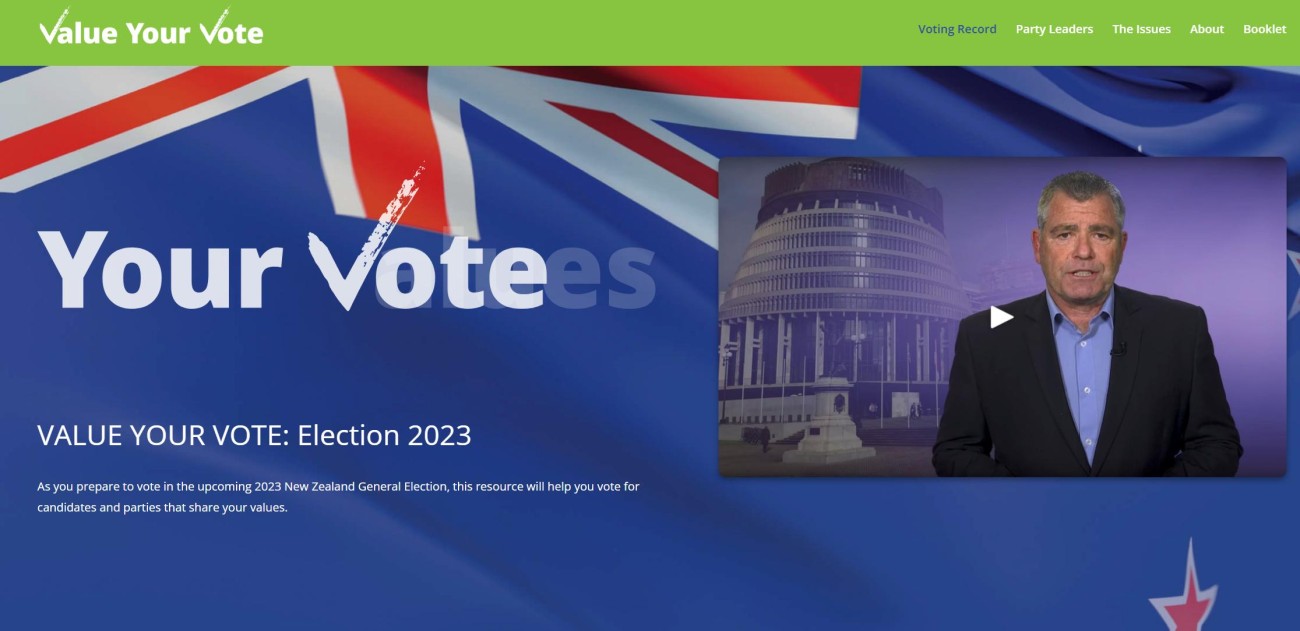Family First has released their usual information guide for voters. It shows how politicians have voted on social issues and how party leaders say they would vote on those issues or potential issues today. As an informational tool it is useful and amazingly comprehensive, but there's no metric or direction provided for restoring order.
It's great to show socially conservative friends, family, and acquaintances how bad the track records of Luxon, Seymour, and Peters are. Yet it fails to chart a way forward—what do people do with this information? As one of Bob's panellists on Monday's show said to him "it won't change a single vote."
I shall follow with a critique, not of the hard work they've done to create this resource, but of the kinds of changes this information should spur us to pursue.
"Value Your Vote" is largely about previous battles (marriage, abortion, euthanasia, gender) and not the "war" overall. There's a few questions about banning harmful things like critical theory from schools, but nothing big about real support for families. Should all these issues really have the same weighting for conservatives?
I am surprised to still see "enshrine binding citizen's initiated referenda" as an issue Family First advocates for. This shows a continued rejection of the reality that conservatives are a minority. There has to be a reckoning with the liberalism that got us here and what we need to replace it with. There's no thought put into how to get a minority group to organise in a political system that's specifically designed for minority groups to succeed.
If you could pull off a political counteroffensive anywhere in the Anglosphere, New Zealand under MMP is where it will be the easiest.
The list of issues sort of reminds me of the scattershot policy that minor political parties get baited into every election: cover lots of niche ground with no clear hierarchy. Family First intentionally avoids zooming in and really avoids pointing voters in a useful direction. I wrote about that last week in what I hope will be a public dialogue with Bob McCroskrie that can run over many years.
"Value Your Vote" has a much bigger problem though. Past actions and current words are not a predictor of positive future actions under a system of eternal social progress.
I've previously noted how National leaders like English, Bridges, and Luxon have to sell their souls for the leadership and recant previous votes. You look at Peters' 49% voting record and his 80% survey response rating. Which is more accurate, do you think? A few weeks back someone took a jab at Peters for voting against civil unions, or some such liberal legislation that is now universally embraced, and the response from his supporters rang "that was a long time ago."
So sound the drums of progress.
This encapsulates my problem "populist parties" which have a tendency to produce progressive politicians, because progressivism is popular. Nationalist-populist parties have their place, but are not the right answer. A new conservative solution is needed.
Christopher Luxon didn't respond to the Family First questionnaire. He's not stupid. He knows he can only win without Bob and his issues. This is a big step down from having the Prime Minister show up to his Forum back in 2014.
For National in 2023, opposition to Family First is key in their path to victory.
Bob's Twitter bio has an endorsement from The Spinoff: "More politically influential than the average backbench MP." Granted, this is not a tough bar to clear, but come the 2023-2026 Parliamentary cycle there will not be a single MP who will hold the line for Bob McCroskrie in public.
In the past 30 years, the attempts to create a pro-family parliamentary faction have all failed. A commenter asked me last week how I was aiming to achieve anything different when in 2002 and 2005 United Future managed to have Christian MPs and all other attempts have been a failure. On the contrary, 2002 and 2005 were the failures. Nothing was gained and much was lost. The impact was negative, the country would likely be better off if they had never succeeded. I listened to a speech by a former MP from this era and was struck by the fact that 20 years later these people had learned nothing. They seem to have put no effort into understanding what a win would look like or making concrete steps to achieve that end—even if mostly on paper like yours truly. The "hopium" that Cam Slater talks about still gets huffed election in and election out. In contrast, Nigel Farage has been the most influential man in British politics in the last half century. He has never won a parliamentary election. He has never commanded a single MP, but he has channelled his political energy to achieve victory after victory.
This election we're finally seeing sex and gender issues go mainstream with much consternation from the media. That's an issue we have tried to push into the spotlight for years and years. Hearing other politicians be forced to talk about it brings me much joy and confidence. That's a very small window into the kind of success that can be leveraged by the right people. If you can "waste" enough votes to bring down your enemies or make them adopt your policies to stop you, then you're still winning.
We know that people don't really value their votes. They'll give them away for nothing. They'll even give them away to politicians who actively work against their interests.
Now that's something we should all figure out how to take advantage of.
